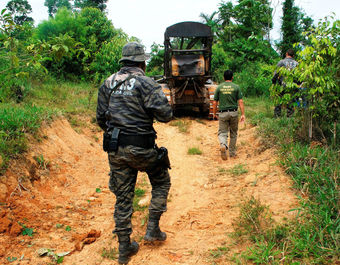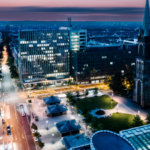July 5, 2014 – The picture below, courtesy of Jeff Tollefson of Inside Climate News, is not of a soldier, but a member of the Brazilian Institute of Environment and Renewable Natural Resources, known for short as IBAMA, an environmental enforcement agency fighting illegal loggers in the Amazonian rainforest. Just a few weeks ago men like the one depicted here captured an illegal logging operation and burned three of their trucks and a tractor. This act of interdiction led to a riot in a local town with the agents finding themselves under siege at a local hotel.
The conservation of the rainforest is confronted by other policies of government in Brazil focused on development of the country’s interior resources. Since the 1970s the Amazon has seen hundreds of thousands of Brazilians go north and west in search of business opportunities on the new frontier. It is very much a scene from the American Wild West with the frontier being pushed further and further into the interior. The major difference is Brazil is tackling its frontier with the technology of the 2oth and 21st century with all the potential to create mass devastation in the Amazon Basin.
Brazilians continue to get mixed messages from their government. Develop! Don’t develop! IBAMA, the agency given the responsibility of ratcheting down the destruction finds itself fighting a rearguard action against illegal loggers who have in 40 years reduced the rainforest by 20%. Hundreds have died in confrontations associated with illegal logging. And the illegality isn’t just limited to the logging. Illegal farming on clear cut rainforest land is further complicating IBAMA’s policing responsibilities.
Deforestation has consequences for climate. The decline of the Amazon rainforest is associated with increasing episodes of drought in Amazonia. Drought conditions are promoting wildfires that further threaten the rainforest. And drought also is causing water levels in the Amazon Basin to drop in some cases as much as 12 meters (40 feet).
So while all of us are watching Brazil host the FIFA World Cup, an eco-war is happening in the background, a battle that is of far greater consequence than the one being played on the football pitches that include Rio, Sao Paulo, Cuiaba in the Pantanal and Manaus in the heart of Amazonia itself.













